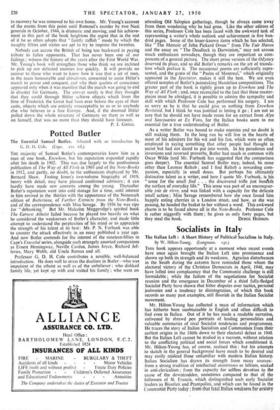Potted Butler
THE majority of Samuel Butler's contemporaries knew him as a man of one book, Erewhon, but his reputation expanded rapidly after his death in 1902. This was due largely to the posthumous publication of The Way of All Flesh in 1903 and of the Note-Books in 1912, and partly, no doubt, to the enthusiasm displayed by Mr. Bernard Shaw. Festing Jones's two-volume biography of 1919, heavy with detail, may have pleased confirmed admirers ; it can hardly have made new converts among the young. Thereafter Butler's reputation went into cold storage for a time, until interest in him revived in the thirties with the appearance of the Nonesuch edition of Butleriana, of Further Extracts from the Note-Books, and of the correspondence with Miss Savage. By -1936 he was ripe for "debunking." But Mr. Malcolm Muggeridge's spirited book The Earnest Atheist failed because he played too heavily on what he considered the weaknesses of Butler's character, and made little attempt to understand the perplexities of his mind or to appreciate the strength of his talent at its best: Mr. P. N. Furbank was able to counter the attack effectively in an essay published a year ago. And now Butler contends for the interest of the nineteen-fifties in Cape's Essential series, alongside such strangely assorted companions as Ernest Hemingway, Neville Cardus, James Joyce, Richard Jef- feries, Mary Webb, old Uncle Remus and all.
Professor G. D. H. Cole contributes a sensible, well-balanced introduction. He does well to stress the dualism in Butler—who was impatient of the atheist as well as of the unbeliever ; who disliked family life, yet kept up with and visited his family ; who went on attending Old Salopian gatherings, though he always came away from them wondering why he had gone. Like the other editors of this series, Professor Cole has been faced with the awkward task of representing a writer's whole outlook and achievement in five hun- dred pages. Some of the lesser-known items which he has selected, like "The Memoir of John Pickard Owen" from The Fair Haven and the essay on "The Deadlock in Darwinism," may not arouse much enthusiasm nowadays, though they are important as com- ponents of a general picture. The 'short prose version of the Odyssey deserved its place, and so did Butler's remarks on the art of transla- tion which preface it. The occasional poems are sufficiently repre- sented, and the gusto of the "Psalm of Montreal," which originally appeared in the Spectator, makes it still the best. We are even offered Samples of Butler's painstaking Handelian compositions. The greater part of the book is rightly given up to Erewhon and The Way of All Flesh ; and, once reconciled to the fact that these master- pieces must be abridged, it is possible to admire the sympathy and skill with which Professor Cole has performed his surgery. I am as sorry as he is that he could give us nothing from Erewhon Revisited, but I think he was justified in letting it go ; I am not so sure that he should not have made room for an extract from Alps and Sanctuaries or Ex Voto, for the Italian books seem to me essential for a true understanding of Butler.
As a writer Butler was bound to make enemies and no doubt is still making them. In the long run he will live in the hearts of most of his admirers for his wit and his fun, which were so often employed in saying something that other people had thought in secret but had not dared to put into words. In his paradoxes and inversions and reversed proverbs, Butler had much in common with Oscar Wilde (and Mr. Furbank has suggested that the comparison goes deeper). The essential Samuel Butler may, indeed, be none other than Leumas Reltub ; and I find Reltub a rewarding com- panion, especially in small doses. But perhaps his ultimately distinctive talent as a writer, and here I quote Mr. Furbank, is his "sense for the small find . . . the discovered trifle just bene%th the surface of everyday life." This sense was part of an unconquer- able joie de vivre, and was linked with a capacity for the delicate small action ; Miss Savage remembered how she once found him happily eating cherries in a London street, and how, as she was passing, he handed the basket to her without a word. This awkward charm is to be found above all in the Note-Books. Professor Cole is rather niggardly with them ; he gives us only forty pages, but










































 Previous page
Previous page